#anyway hello i am here with yet another contrived situation
Photo
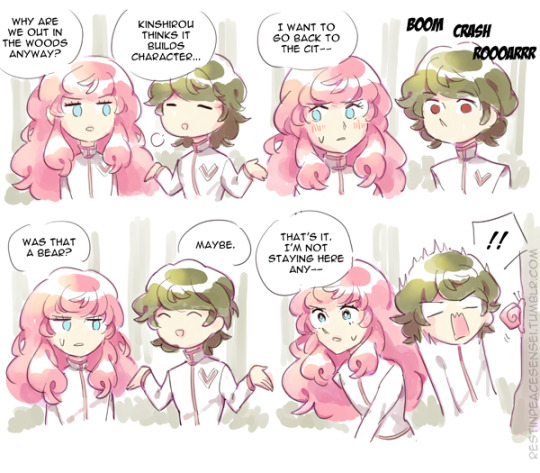
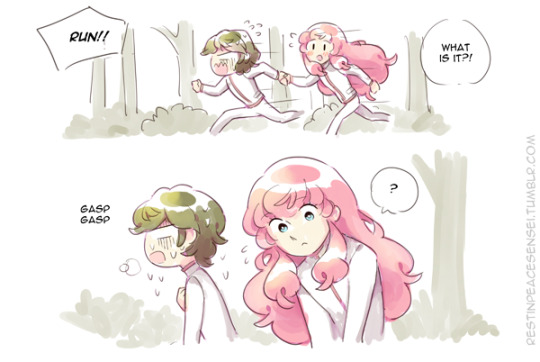
embarrassing comic continues under the cut
content warning: unsanitary
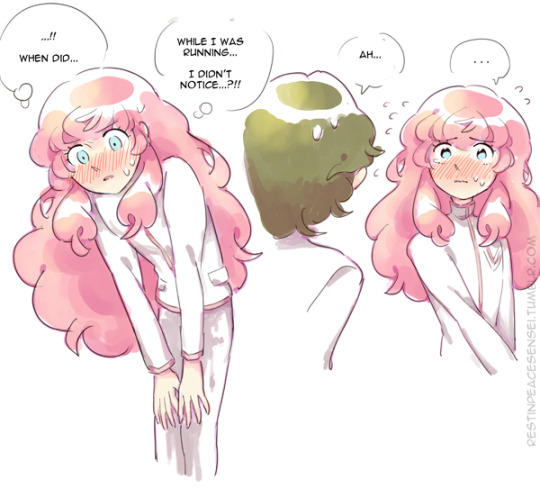
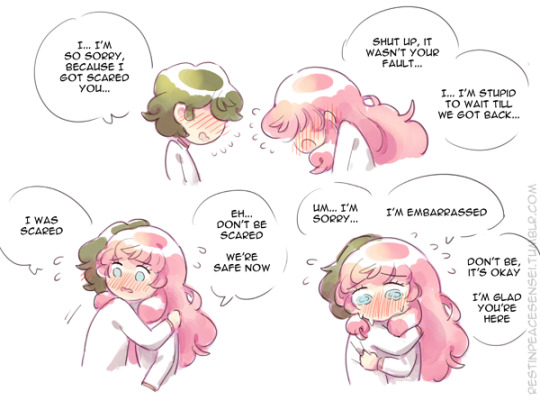
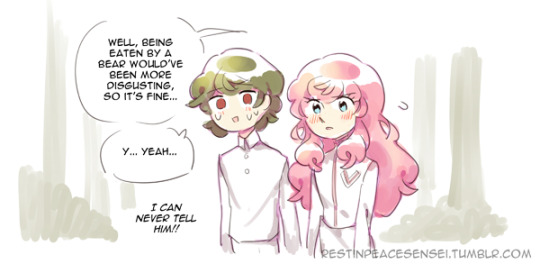
#akoya gero#arima ibushi#my art#my comic#unsanitary -#im experimenting with breaking the comic up as a compromise between having it all upfront or having it all behind a cut#altho i don't rly like interrupting the pace to give a warning;;;;#anyway hello i am here with yet another contrived situation#this is like the 3rd time ive used a snail for this im so sorry neither of them deserve it#i dont remember the last time i posted something embarrassing so clearly it was Time#pl-please be nice to them ;;;;;;;;;;;;;;#uhm this is why he wanted to go back to the city#im embarrassed bye ;;;;;;;#i think hes cute and i want him to be hugged and jvbgdfhfdh weeps;;;;;;;;;;;;;;
35 notes
·
View notes
Text
he’s a funny man (that man of mine)
George Luz x Reader
Summary: At the tail end of your USO-tour, and staring down the reality of returning to Hollywood and the studio-controlled life you’ve always known, you meet a man who makes you break all your rules of starlet survival.

You realize that chucking the magazine at your agent, Douglass Weil, entirely undermines your point, but the immediate (if short-lived) relief of sending that rag and its lies spiraling toward the man who contrived it feels, well, almost worth it. You’ll regret it later, you know, but when it smacks his rectangular nose and flops limply into his lap, a swell of satisfaction balloons your chest and straightens your back, squaring your shoulder as if you aren’t wearing a gauzy silk dressing gown.
“Darling,” he drawls, his Californian accent the latest borrowed detail about him: his padded-shouldered suit, his jauntily slanted fedora, hell, his name is a fabrication; another Hollywood illusion schemed up in the backlots of Burbank. Not that I’m any better, you think, darkly. He reaches to cradle your hands but you jerk away, turning resolutely back to your mirror to finish your mascara. Not to be deterred, he tries: “Darling, it’s no skin off your nose; it’ll look good for the kid’s new picture and Mr. Warner promised, if you’re a good girl, he’s got a part all lined up. A movie musical with Freddy Astaire—they’ll wrestle him away from Ginger for you! All you need to do is go on a few dates with this boy when you get back from this silly tour.”
Your shoulders stiffen: the USO tour—base hoping around northern France—had been a lifeline, a ticket out from Los Angeles and underneath the thumb of Jack Warner, and your stomach churns to think that here, little, grimy Mourmelon, would be your last stop before Douglass frog-marches you to staged dates with your ‘boyfriend,’ Alexander Blake. You realize there’s a war on here in Europe, sure, but it’s the closest to peace you’ve known in, well, years.
But Douglass promised—threatened, more like, you think—to join you for the last performance way back in August when you set off for Paris, and ‘accompany’ you home. And, arrive he did, right on schedule, here to end your brief flirtation with a normal life.
You return the mascara wand to its tube before snatching up a powder puff, applying a thick layer to withstand the grueling stage lights. Through the mirror, you cock an eyebrow at Douglass. “What happened to that promise of more serious parts? Roles with substance?”
Douglass spreads his heads, as if asking what he could possibly do, and you bite the inside of your cheek to keep from snapping, or worse, crying. As a little girl, filling the bit parts and making the audience melt, you witnessed starlets—pretty things with shining blonde curls and tiny waists—throw tantrums with the full water works. Men bent and scraped, if only to stop the tears, and you swore to yourself then you’d never cry for what you wanted—never cry for anything. You’d never cry and allow a man to see you. If you can help it, showing any kind of emotion isn’t preferable. Emotions can be manipulated; emotions are weapons of mass destruction, and your war is against Douglass—Mr. Warner—hell, all of Hollywood. Or, at least, a war against letting them swallow you up and spit you out as someone you don’t recognize (with a pitting stomach, you wonder how throwing the magazine at Douglass might be twisted against you; yes, you knew you’d regret it).
Putting aside the puff, you shuck off the dressing gown, taking a moment to arrange the red cocktail dress underneath. “I’ll see you after the show,” you throw over your shoulder, slamming the dressing room door behind you before Douglass can think to follow.
Heat burns the inside of your chest, razing your throat, and you want to pound your firsts against the hallway walls—you want to scream and cry—but you know it won’t help. It won’t make you feel any better and, anyway, it’ll leave you with bruises when you go onstage.
Damn Douglass and damn Alexander Blake, though you have no idea who the kid is: another youngster in the parade of youngsters the studios want to make into the next Cary Grant, or Clark Gable—make into someone desirable, someone who a beloved movie-musical actress like yourself would be interested in taking to lunch here, to dinner there, perhaps even to an aperitif, too. Because why not rub it in my face that I’m just some silly girl who’s only allowed to flutter her eyelashes and do the Charleston?
Sucking down a breath, you decide to go check in on your dancers—the girls who piled into transport trucks and traversed France with you—and set off towards their shared dressing room. They chatter incessantly, true, and sometimes about silly things like ‘making it big’ and ‘catching a break,’ but Mary-Frances also reads all about this new thing called insulin, and Joyce keeps up with the stock market with her subscription of The Wall Street Journal, and Betty is teaching herself how to fix up automobile engines. They’re interesting girls—allowed to be interesting and multitalented and alive—and you’d never tell them how horribly you wish to be them; they’d never believe you, anyway. So, you go for the second-best thing: to sit and listen to their overlapping babble.
Or, you thought you were going to them. But, as you continue, taking one right, then a left, then another, the hastily-constructed plaster walls, pocked by wooden doors, seem to stretch into a uniformly unfamiliar infinity. Frowning, you mulishly continue on, the click of your heels ricocheting through the deserted corridors of the military compound. Your dressing room is situated near the stage, the familiar pre-performance hubbub of gaffers, stage boys, lighting crew, and costumers offering an ambient noise to tickle your ears, but their calls had been left behind at the second turn. Silence reigns over you now.
“Oh, for Pete’s sake,” you mutter, the echo of your voice the only reply.
Then: “Sorry, doll, the name’s George, not Pete.”
A door, you hadn’t noticed it was ajar earlier, swings in, allowing a crooked smile to appear. The man wearing it has an angular jaw, hair insistent on flying away at all angles, and eyes apparently jealous of his smile—they crinkle into crescents, contributing their own amusement to shine brighter than a mere crook of a grin. “Uh, hello,” you greet.
“Hello yourself,” he replies, leaning a shoulder against the doorjamb. “Who’s Pete?”
“Oh, no, I meant it as—” you begin to clarify, interrupting yourself as you watch his smile widening: “Oh, you were joking.”
“Call it a character defect: I’m chronically joking,” the man—George?—says, pushing off from the doorjamb. “But, uh, and I’m not trying to be rude, here, but you’re not supposed to be wandering around here.” His eyes sweep over your red dress, the artificial flower pinning your hair back, and you brace yourself for recognition: the mystified expression, the garbled, tripping words. You love your fans—they’re better than Judy Garland or Marlene Dietrich’s, you know—but you always wonder why being in movies calls for fans to take leave of their common sense. Yet, all he says is: “You in the show? A dancer?”
Relief eases your shoulders and you cling to his handy excuse: “Yes, a dancer, that’s exactly right.” Ignoring his raised brow, you hurry on: “A very lost dancer, unfortunately. I meant to go down the hall to another dressing room and, well, here I am.”
Sliding his hands into his trouser pockets, he replies, “You’re lucky they got me tinkering with radios back here. It’s an absolute maze; you would’ve been hopelessly lost. Could’ve wasted away and no one would be the wiser. We would’ve found your skeleton in about seventy years, all shriveled up and just your big flower there left.” He points to the artificial flower.
Biting your lip to stifle a laugh—you don’t notice his small, little disappointed frown—you return: “I don’t love the idea of wasting away, honestly; would you mind pointing me in the right direction, preferably the one that doesn’t lead to any wasting?”
He shrugs, pulling an exaggerated expression, all jut-out lips and lifted eyebrows. “Sure thing, but, I can do you one better: I’ll personally escort you back to them show people.” Setting off down the hall, slowing his steps to oblige your slower steps in your heels, he adds, “Stick with ol’ Georgie Porgie, and he’ll look after you.”
“‘Georgie Porgie?’” you repeat, another laugh threatening to bubble up.
George feigns a blanche. “Did I say that out loud? Silly me, I say the darnest things.” He flaps his hand in embarrassment, and it’s harder to keep your laughter down. Still, you manage. George tacks on after a beat: “It’s what the fellas in my company like to call me, ‘Georgie Porgie;’ they’ve got a whole song that goes—uh, well, maybe it’s not appropriate for present, polite company.”
“What? Is it crass?” you ask, innocently. It’s suddenly immensely intriguing to study the faint shading of pink seeping from his ears and across his cheeks. “Lots of swearing and vulgarity?”
Grinning in acknowledgement of your teasing, but agreeing with gravity, George warns: “Enough to make your ears absolutely bleed. I’m protecting you here; you should thank me—and it’s a right here.”
“Really?” you ask, glancing around as George turns right and you follow. “And not a left? Are you sure?”
“Yep.” He pops the ‘p’ sound. “Sure as sure; why? You interested in wasting away all of a sudden?”
“Oh, no. Decidedly not.”
“Or getting us lost together, huh?” His eyebrows climb in scandalized implication. “I’ve got to warn you: I’m not that kind of fella; I’m classy, and you’d have to at least buy me dinner first.”
You snort. “What kind of dinner are we talking here? At the Ritz with desert, appetizers, and vintage wine, or at a burger stand with a side of extra fries?”
George seems to genuinely consider the question. “Is there chance of getting fries at the Ritz? The convenience of it being at a hotel is something to consider—” it’s such a mild innuendo, not even accompanied with the winks and leers you’ve grown accustomed to from parties in Beverly Hills mansions, but it still scalds your skin, snagging your breath, “—but the fries . . .”
Valiantly, you ignore your blush, hoping your foundation is thick enough to disguise it. “If memory serves, there’s a scarcity of fries at the Ritz.”
“Whoa, we’ve got a class-act dame over here,” George bursts, clutching one hand to his chest, fanning himself with the other. “You’ve been to the Ritz? Geez; how fancy would you say you are? On a scale from ‘eating jars of caviar’ to ‘bathing in money?’ Like—what, a solid ‘wears diamonds once and then throws them away?’ That’s pretty fancy, you know.”
And you can’t help it this time: the laughter bubbling in your stomach, before at a low simmering, boils over and bursts from your mouth. You have to stop walking, George continuing on a few steps before your faint wheezes materialize into proper laughs. He stills, observing you with a slow-spreading elation. A hand covers your mouth, as if trying to shove the giggles back into your mouth, but it does nothing—not even mutes your snort. Snorting! You hold up a finger as you laugh and manage a chopped: “First of all, money is extremely unsanitary; I’d never bathe in it—”
George folds his arms. Before content to watch your laughter, his smile threatening to shatter his face in two, he can’t help interjecting: “Alright, well what’s your scale of fanciness then, huh? If money is so dirty?”
“You sound like the Lone Ranger, or something; all holier-than-thou,” you reply, dabbing delicately at your eyes as you subside into hiccups. You hope your mascara isn’t running, hope you don’t look entirely like a deranged raccoon. Putting on a John Wayne impression, voice gravelly and low, you say, “‘I don’t want your di-rt-y, blood money.”
He sniffs. “I prefer a Wyatt Earp-type character.”
Tilting your head, you squint at him and he puffs under your scrutiny, squaring his shoulders and planting his feet. His hands go to his hips, giving him the illusion of having a broader chest. Carefully you keep your face neutral, neutral to your teeming mind noting the hint of muscles under his uniform sleeves, hard pectorals pulling at his shirtfront, and offer, “I see it just a little bit.”
Deflating dramatically, he shrugs. “I guess that’s the best I can hope for, huh?”
Patting his chest as you start off again—yes, just as toned as they appear—you assure, “Absolutely. Now, come on—is this still the right way?”
. . .
George delivers you to the corridor connecting to the wings of the stage, the tour’s frazzled stage manager swooping in on you with preternatural speed. “There you are!” he says, jabbing an accusatory finger, and you offer a weak smile of apology. You’d broken your golden rule: don’t make the technical staff lose hair over you. “Do you know we’re on in two minutes? Where have you been? Never mind, I don’t want to know; who’s this?”
The stage manager’s eyes swing to George.
Finding your voice out of necessity to protect the innocent—though you doubted that’s an adjective often ascribed to George—you hastily explain: “He’s a friend; he helped me find my way back here. Can we get him a front row seat?”
The stage manager’s mouth hinges open, ready to protest, before he tosses his hands. “Sure, why not? Let’s add one more thing to my plate!” He pivots sharply, wrenching the door to the darkened backstage, striding into the gloom.
“What a nice guy,” George observes as a troop of brass players, the opening number for your tour’s line-up, hurries past. Turning to you, he asks, “What kind of dancer are you that you can ask for front row seats for little old me, though, huh? Not that I don’t appreciate it, mind, but—”
“It’s my way of saying ‘thank you;’ we’ll be square for you helping me,” you interrupt. Though he coaxed a smile and laughter from you, you weren’t about to go owing George—you don’t owe anyone anything. You’ve heard the horror stories of actresses taking out one too many favors; you couldn’t let yourself get into the habit.
George’s eyebrows scrunch at the word ‘square,’ and you can see an argument brewing on his face—something about favors without recompression, and not being any trouble at all—but the stage manager bursts from backstage, trumpeting: “I have exactly thirty seconds to get this man into his requested front row seat and you, Miss y/n, have exactly sixty seconds before you’re on stage.”
“Got it, thank you so, so much.” You flash a smile, a smile that pays your bills with its brilliance, and the stage manager softens. He gives a stiff nod, as much forgiveness as he’s willing to dole out just then, and sweeps backstage once more.
“Alright, you’ve got to go grab your seat . . . ” you begin, the words shriveling on your tongue when you see George’s slackened expression, color drained from his skin. You cough, and try for a joke: “What? What is it? Is something on my face?”
“What do you mean ‘what?’” George squawks. “Y-you’re—? Why didn’t you—?”
Say something? You mentally fill in, placing a hand on George’s shoulder. “Because I didn’t want you to react like this, Georgie Porgie.” You pause, tracking how his lips press into a line—a line that crams all his questions and flustered annoyances back in—before leaning in to him. “Thank you for not letting me waste away.” And, you do something you’ve never done—despite coaching from the film studio executives, from Douglass, from every publicist; always deriding it as cheap and tawdry, serpentine women’s ploy to pull over on susceptible men—you kiss his cheek.
(When you slid into the darkness of backstage, stealing into the wings to bump shoulders and trade smiles with your dancers, you leave behind a gaping George Luz. He collects himself just as the brass band files off, taking his seat as the lights come up on your opening number. You feel his eyes on you—tracing the smooth skin of your neck exposed in a great expanse by the dress’ plunging neckline—feel his smile returning your cellophane, ready-made grins shot ambiguously out at the faceless crowd. You feel him leaning into your voice, inhabiting it as if to live there forever, as you sing into the microphone of a fictitious ‘sweet darling love’—a darling love you never would have thought existed for you, in your Hollywood-saturated world.)
(But why even dwell on it? you scold yourself, it’s not like I’ll ever see him again.)
Tags: @maiden-of-gondor @gottapenny @wexhappyxfew
#band of brothers#band of brothers fic#band of brothers imagine#band of brothers imagines#george luz#george luz x reader#george luz imagine#my writing
71 notes
·
View notes